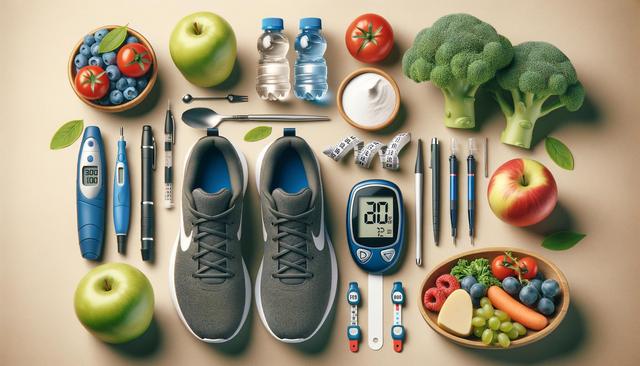Proven Strategies to Manage Type 2 Diabetes & Maintain Healthy Sugar Levels
Understanding and Monitoring Your Blood Sugar Levels
Managing type 2 diabetes effectively begins with a thorough understanding of how your blood sugar levels fluctuate throughout the day. Regular monitoring is crucial as it provides insight into how your body responds to different foods, activities, and medications. To control type 2 diabetes, consider keeping a daily log of your blood glucose readings. This can help identify patterns and triggers of high sugar levels, allowing for more informed decisions about your diabetes management plan. Additionally, investing in a reliable glucose meter and learning how to use it properly can empower you to take control of your condition. Understanding these patterns can guide you in adjusting your diabetes diet plan and adopting natural diabetes control methods.

Incorporating the Best Foods for Diabetes into Your Diet
A balanced diet plays a pivotal role in managing type 2 diabetes. Including the best food for diabetes in your meals can significantly impact your blood sugar levels. Focus on foods that are high in fiber, such as whole grains, legumes, and vegetables, as they help slow down the absorption of sugar. Additionally, lean proteins like chicken, fish, and tofu can keep you full longer and prevent spikes in blood sugar. It’s also beneficial to incorporate healthy fats found in nuts, seeds, and avocados, which provide essential nutrients while supporting stable glucose levels. A well-rounded diabetes diet plan can be a cornerstone of your management strategy, ensuring you receive the nutrients needed without compromising your health.
Adopting Lifestyle Habits for Natural Diabetes Control
Beyond diet, certain lifestyle habits can significantly aid in natural diabetes control. Regular physical activity, for instance, is a powerful tool in managing diabetes. Exercise helps your body use insulin more efficiently, which can lead to better blood sugar control. Aim for at least 150 minutes of moderate aerobic activity per week, such as walking, swimming, or cycling. Additionally, managing stress through techniques like meditation or yoga can prevent stress-induced spikes in blood sugar. Prioritizing sleep is equally important, as inadequate rest can affect insulin sensitivity. By integrating these habits into your routine, you can enhance your overall diabetes management efforts.
Utilizing Diabetes Control Supplements and Juices
While a healthy diet and active lifestyle are vital, some individuals may benefit from diabetes control supplements and juices as part of their 28-day diabetes plan. Supplements containing ingredients like cinnamon, alpha-lipoic acid, or chromium may support blood sugar regulation. However, it’s essential to consult with a healthcare provider before starting any new supplement to ensure it’s appropriate for your specific needs. Additionally, incorporating diabetes control juice made from vegetables like bitter gourd or celery can be a refreshing way to boost your nutrient intake. These juices can complement your sugar diabetes diet, providing additional support in maintaining healthy glucose levels.
Creating a Sustainable 28-Day Diabetes Plan
Developing a structured 28-day diabetes plan can help establish consistent habits that contribute to better diabetes management. Start by setting realistic goals, such as aiming for specific blood sugar targets or incorporating a new healthy habit each week. Create a weekly meal plan that includes a variety of foods while adhering to your diabetes diet plan. This can help reduce the temptation of unhealthy choices and ensure you have the best food for diabetes readily available. Additionally, track your progress by noting changes in your blood sugar levels and how you feel physically and mentally. This feedback loop can motivate you to stick with your plan and make adjustments as needed, ultimately leading to long-term success in managing type 2 diabetes.
